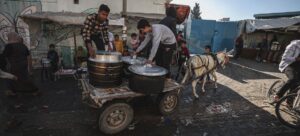
The BiH Labor and Employment Agency has announced a new call for nurses and medical school staff from Bosnia and Herzegovina who, through the Triple Win project, want to find a job in that profession in Germany.
The Agency implements this project in partnership with the German Federal Employment Agency (ZAV) and is implemented by the German Society for International Cooperation (GIZ).
Health care professionals interested in working in Germany can apply for the first interview in 2020 until 7 February.
Only nurses and medical staff can apply for the call, while interviews will be held from February 24 to 28, 2020 in Sarajevo, Banja Luka and Tuzla.
GIZ notes that since the start of the project in 2012, up to 700 nurses and medical staff have successfully gone through mediation for different employers in Germany.
They point out that the project provides greater security in the process, as it offers systematic and mediated employment with reliable employers in Germany, including monitoring, which means continued contact with the candidate, from the application to the call procedure, until their full integration into German society.
During this period the candidate has full support in the preparation, departure and integration into the new environment.
Candidates are prepared through free language courses, professional and orientation courses, followed by assistance in connecting with employers in Germany and signing employment contracts.
Germany’s nursing sector is already feeling the impact of a significant shortage of nurses today. At present, vacancies outnumber the amount of qualified job seekers on the job market. According to expert estimations, the nursing sector will need 150,000 new nurses by 2025. Demographic changes in the country will exacerbate this situation in the medium and long term.
By contrast, in Bosnia and Herzegovina, Serbia and the Philippines, there is a surplus of qualified experts that cannot be absorbed by the local labour markets. This has resulted in a high level of unemployment among nurses in these countries.
The recruitment of qualified foreign nurses is alleviating the nursing shortage in Germany and reducing unemployment in the nurses’ countries of origin. The migrants’ remittances and the transfer of know-how contribute to development in the countries of origin.
GIZ supports the process with its international field structure, focusing on the promotion of the nurses’ German language skills, their professional preparation for the placement, and encouraging their integration after their arrival in Germany. GIZ also coordinates the recognition process for the qualifications acquired abroad. The other contributor to the project, ZAV, is responsible for placing the candidates.
The project is based on placement agreements that have already been concluded between ZAV and the employment agencies in the partner countries. This means that after their foreign credentials have been recognised in Germany, the nurses who have been placed can take up employment commensurate with their qualifications and in the medium term will be entitled to a settlement permit.
In selecting partner countries, the project takes into consideration those countries which have a surplus of well trained nurses. This is intended to prevent brain drain. In other words, placing nurses in Germany must not create a shortage of nurses in the countries of origin. Furthermore, the high standard of the nurses’ qualifications means that they can integrate more effectively when in Germany. In the light of these considerations, the project plans to include Serbia, Bosnia and Herzegovina, the Philippines and probably Tunisia as partner countries. The standard of training in these countries is nearly the same as in Germany, and some nurses already have a good command of German.
The cooperation between ZAV, GIZ and the employment agencies in the partner countries permits the well coordinated management of the labour migration in a spirit of partnership. The project promotes development and labour policy objectives, while at the same time observing a culture of welcome and appreciation.
From the beginning of the project until now (2012 to November 2019), more than 3,000 nurses have been placed with German employers, in clinics, geriatric care homes and out-patient services. Of these above 2,100 have already started working in Germany, while 290 are still undergoing their preparations in their home countries. Another 284 Triple-Win positions have yet to be filled. The demand continues to grow, both among the nursing staff and on the part of the employers. Project monitoring has verified that the selected nurses possess a high level of professional qualification. The employers were highly satisfied with the international nurses.

















